Bayla Ostrach and Ron Lare
April 7, 2018
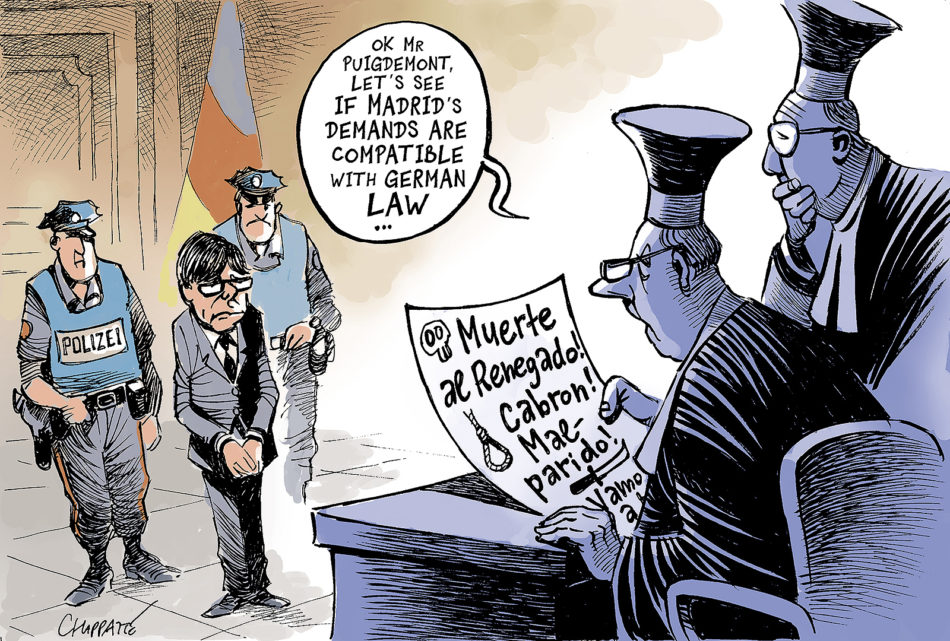 Imagining German courts’ take on Spanish state’s position as “Death to the Renegade” Cartoon: Chappattee in Le Temps Switzerland
Imagining German courts’ take on Spanish state’s position as “Death to the Renegade” Cartoon: Chappattee in Le Temps SwitzerlandOn March 23rd, the Spanish government announced prison sentences of up to thirty years each for thirteen democratically elected Catalan leaders, under an ongoing coup.1 Six were already in exile, others had already been in jail for months, now joined by others facing a combined bail set at the equivalent of $2.6 million U.S. (the estimated cost of the Oct. 1st, 2017 referendum on full separation from Spain). International protests were hastily organized, including in Boston and New York.
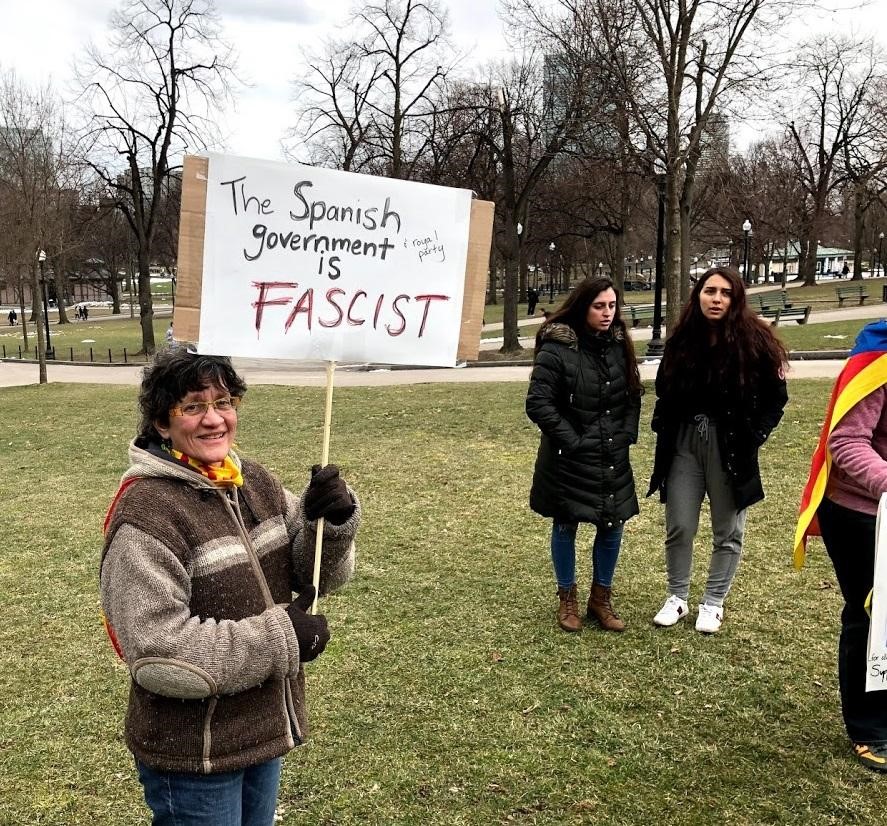 Boston protest against Spanish coup, March 24th. Photo: Ester Serra Luque.
Boston protest against Spanish coup, March 24th. Photo: Ester Serra Luque.Two days later, German military police aided the Spanish coup by arresting Catalunya’s elected but exiled leader, Carles Puigdemont, after his car entered Germany from Finland en route to Belgium, where he had otherwise thus far been staying safe from prosecution by the Spanish State since declaring the Catalan Republic in October. The Spanish government demanded Puigdemont’s return to face charges of “rebellion, embezzlement (for the costs of holding the referendum), and disobedience (to the crown).” Catalan police and an historian traveling with Puigdemont were also detained. Protests erupted in Catalunya immediately, as a contact there wrote the same day,
Catalonia right now: highways are made for walking! Protesters block roads and highways connecting Catalonia with Spain and France and surround Spanish governmental buildings after [exiled] Catalan leader was arrested today in Germany. Police are charging the crowds with batons and rubber bullets and there’s dozens of injured reported. From my friends on the ground in Barcelona: “when people get injured by the police, they move to the back of the crowd and others step forward and take their place.” The time for the “smiling revolution”, as the Catalan movement was labeled a year ago, is over. It seems the time for the #PrimaveraCatalana#CatalanSpring has come…
– Ester Serra Luque, Catalan journalist based in Boston
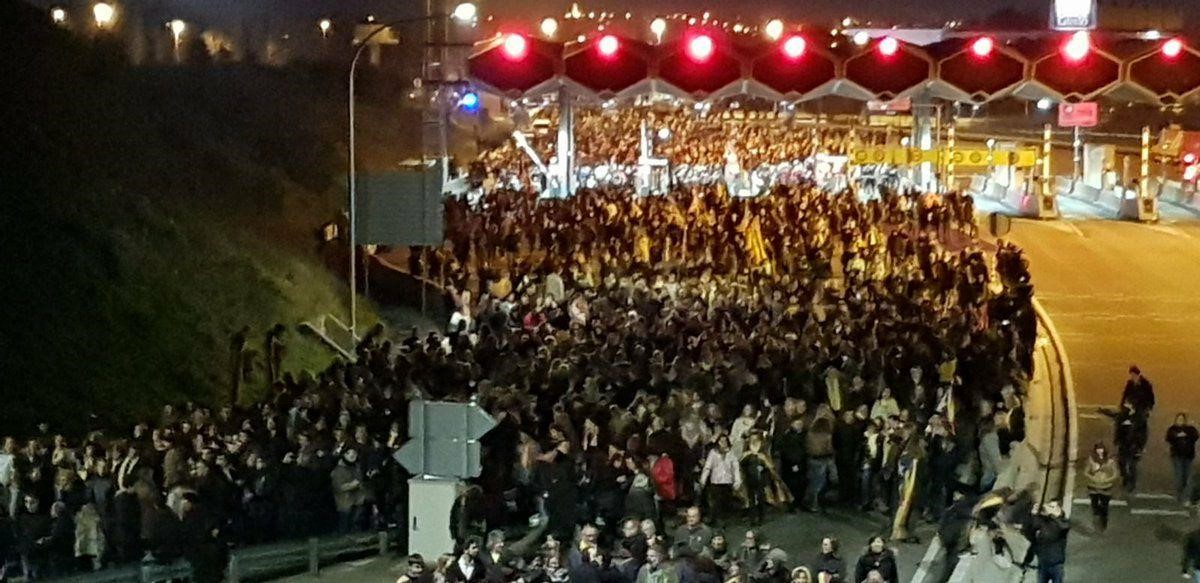 Catalan toll highway blocked (photo circulated by Catalan activists)
Catalan toll highway blocked (photo circulated by Catalan activists)The arrest of a democratically elected president of the Catalan Republic by Germany, for possible delivery to a Spanish government ruling Catalunya under a coup, evoked chilling reminders of 1940 — the last time Germany extradited a Catalan president to Spain. Hitler’s Gestapo handed over Lluís Companys to the Spanish fascist dictator, Francisco Franco, who soon had Companys executed by firing squad at Montjuic castle in Barcelona. Companys’ tomb now overlooks a mass grave of Republican and anarchist victims of the Spanish Civil War and Franco’s regime – for many Catalans and international allies, the spectre of Puigdemont being similarly delivered to the current Spanish government, by German police, has a similar chilling effect.
As news of Puigdemont’s arrest spread, Catalans responded as they usually do – by taking to the streets, collectively and creatively. While stories of state police brutality against protesters were widespread in and around Barcelona, and in Lleida, things evidently remained more peaceful in Girona, where a friend and colleague reported non-violent protests, including with Castellers (human tower-builders) building towers in the streets, with musicians all around. Because, fem castells on es necessiten (we build castles/human towers where they are needed) and the saying “si els de baix es mouen, els de d’alt cauen” (if those below move, those above fall) is not just symbolic.
By the next day after Puigdemont’s arrest, it was more than clear that the Catalan people – beaten, bloodied, living under a coup, largely ignored by world governments, with their chosen president arrested in Germany and facing extradition, their next presidential candidate also jailed, and all cabinet members and apparent leaders arrested or in exile, were not about to back down. As the CUP (Candidatura d’Unitat Popular, Popular Unity Candidacy, a far-left Catalan political party often described as anarchist, was quoted as announcing, “Hem pres la humil decisió de no retrocedir.” (We have taken the humble decision not to go [step] back).
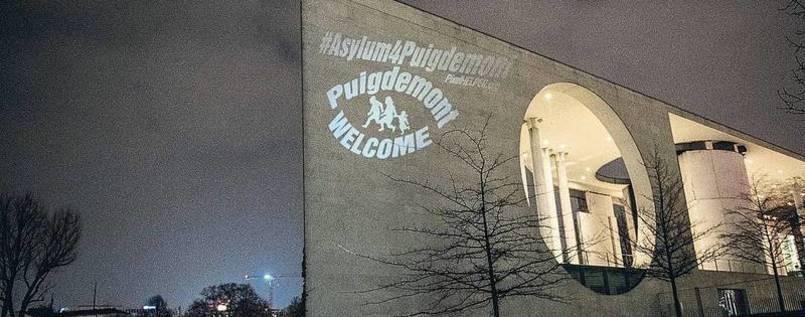 Projected illumination and vigils in Berlin at Chancellor’s Office, Brandenburg Gate, etc. Photo:Twitter.
Projected illumination and vigils in Berlin at Chancellor’s Office, Brandenburg Gate, etc. Photo:Twitter.Germans, too, protested the arrest of the Catalan president within their borders, and expressed concern about his apparent possible extradition.
Mass protests continued throughout Catalunya in the ensuing week:
… with barricades and non-violent civil disobedience, protesters have been blocking the main roads connecting Catalonia, and by extension Spain, to the rest of Europe all day today (if you look at a map, you’ll see that Catalonia is basically the connecting route between Spain and France). Despite police brutality, protesters are keeping strong and non-violent and are planning to also block one of the main train stations in Barcelona…
– Ester Serra Luque
The week turned more grim by March 29th, as a self-organized collective community center, known as an ateneu, in Sarria, a neighborhood of Barcelona that was the site of much independentist and anti-fascist organizing, was burned to the ground and covered in swastikas.
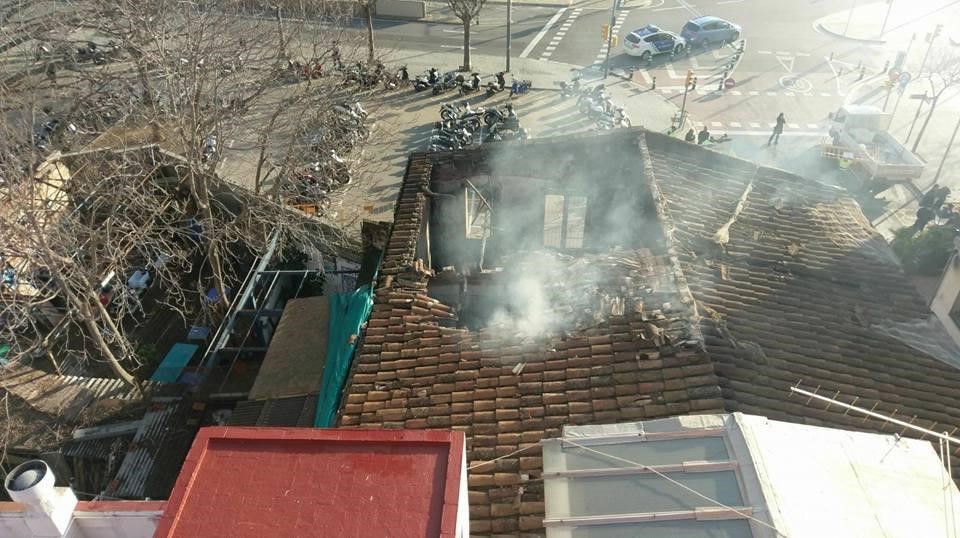

But the next day, an anti-fascist rally was underway, on the same spot, to condemn the attack, and as Ester Serra Luque described:
Indeed, on Easter Sunday, the Spanish Legion, a rapid-deploying unit of the Spanish military, mobilized in this Catalan town to march with a large crucifix. About 300 independentists and anti-fascists protested, met by riot police.…in the meantime, CDRs (grassroots Committees for the Defense of the Republic) are marching into highways and lifting toll barriers under the slogan “Welcome to the Catalan Republic” allowing cars to drive through for free. Protests are also happening in other Catalan cities, including the town of Palafolls, where a Spanish military parade has been scheduled as part of Easter celebrations.
Spain’s extradition demand for Puigdemont was slated to go first to a local German for hearing, but the question had already become a national and international political issue. The highest level of the German government became ultimately politically responsible (regardless of any disclaimers) for deciding on extradition within 60 days. German media speculated that a final decision could be announced shortly after Easter. Massive street actions in Catalunya, and a growing international movement against extradition, reflected and fueled the broader Catalan independentist movement which has steadily proceeded since the October ’17 referendum and the coup-imposed formal election in December.
Under current EU law, a potentially extraditing country can only prosecute, and thus will only extradite, for crimes chargeable in the extraditing nation. German prosecutorial law, we initially heard, does not include the charge of “rebellion” but does outlaw treason— the specific charge for which Companys was executed in Spain, under Franco. The Spanish government in Madrid calls Puigdemont’s support of his people’s peaceful decision to fully separate from Spain a violent overthrow of the government. This “overthrow” was his claiming an office to which he was democratically elected as the leader of an independent Catalunya.
Initial predictions were that Germany could choose to extradite Puigdemont only on the charge of financial impropriety, legally limiting prosecution in Spain to that charge, which Germany could spin as both legally proper and a political compromise. But were Puigdemont to be handed to the Spanish state all bets would be off. The montage below, widely circulated on Twitter, shows the grim fascist heritage at play:

In the era of the Spanish Civil War and leading into World War II, Hitler and Franco supported each other’s efforts, and were seen together; in the 1960s, Franco was seen with the founder of the Partido Popular(PP), Fraga, later seen with the current Prime Minister of Spain and leader of the current coup in Catalunya, Mariano Rajoy.
Prominent Germans quickly spoke out. The co-owner of Der Spiegel, a magazine somewhat familiar in the U.S., calls the threatened extradition “a disgrace for Spain, for Europe, and for Germany.” A conservative German member of the European Parliament, Bernd Lucke, visited Puigdemont in jail, tweeting afterward, “Puigdemont is being unjustly prosecuted. I support his right to freedom of expression and political activity. The Catalunya dispute must be resolved politically, not punitively.”
The German left party, Die Linke, called for Puigdemont’s immediate release and offered him a “permanent residence” in Germany. The German Greens wanted the EU to play a role in mediation. However, the German ruling class wanted EU member nations including Spain to stay united against Brexit and other threatened departures. Though the Catalan Republic applied for EU membership, EU leaders see Catalan independence as a further threat. Larger groups protested at more and more Spanish embassies throughout Europe, daily. More and more yellow ribbons, the chosen Catalan symbol of solidarity with the political prisoners jailed and in exile, were worn not just at home but also internationally. Though they intend to abide by all EU laws and resist peacefully, Catalans are committed to continued fighting – against the coup, and for Puigdemont’s freedom from extradition and Spanish penalties.
Just as this article was being drafted, German news media announced that Puigdemont’s lawyer had publicly asked the German Chancellor to declare that Puigdemont would not be extradited for political reasons. Chancellor Merkel declined. Instead, the German government declared it would remain neutral, leaving the decision to the courts – for good or ill. Mere days later, a German municipal prosecutor in the town where Puigdemont was first imprisoned ruled the Spanish ‘rebellion charge’ equivalent to a German charge of “high treason” (the same grounds under which Hitler delivered Catalan President Companys to Franco in 1940, and under which Companys was executed in Barcelona).
That procedural ruling advanced the extradition hearing to the next highest regional court, where it was heard on April 5, 2018. As a member of the Assemblea Nacional di Catalunya
(ANC) wrote to the first author the night before,
It is indeed uncertain what will happen. If Germany supports the extradition, this would be nothing less than the confirmation of an already dead European Union. The struggle will continue though. Nobody surrenders until victory if achieved.
Coming as a great relief to many, the announcement came on Thursday that the regional court denied rebellion as basis for extradiction. As a result, Puigdemont can no longer be charged with rebellion in Spain, and Germany will not extradite him on that charge. Puigdemont was to be released on bail April 6, though some media reports suggest he is already out; he cannot leave Germany without permission.
The regional court… ruled that the charge of rebellion could not be honored in Germany “because evidence of ‘violence’ is not present,” potentially dealing a blow to Spanish efforts to extradite and prosecute other Catalan separatist leaders (New York Times).
There is still reason for caution, and need for international mobilization in support of Catalan self-determination – Puigdemont could, ostensibly, be extradited on the lesser financial charge.
Meanwhile, reports are emerging from comrades in Barcelona that the Spanish government is newly charging the Catalan Committees for the Defense of the Republic (CDRs), which have organized much of the colorful protest activity and civil disobedience of late, with similar crimes of ‘rebellion’ and ‘sedition’ – while Germany investigates Spain for having illegally tracked Puigdemont’s movements (specifically, geo-tracking his vehicle), while in Belgium or traveling between Germany and Belgium.
Nevertheless, many in Catalunya are celebrating Puigdemont’s (conditional) release and (possibly temporary) reprieve from extradition, with a member of the Catalan National Assembly (grassroots leadership of the independentist movement) posting a photo of a ballot urn from the October 1st referendum filled with ice and bottles of cava.
#PrimaveraCatalana #CatalanSpring #LlibertatPresosPolitics
1. For coverage of events in Catalunya up to this point, see “Catalunya: Together We Build the Republic” and
“Catalunya: Special Election Update” (Solidarity Webzine)as well as “Catalunya: ‘Only the People Save the People’”(Against the Current)
↩
Bayla Ostrach is a member of Solidarity and a medical anthropologist who conducts ongoing fieldwork in the Catalan Republic. She is the author of Health Policy in a Time of Crisis: Abortion, Austerity, and Access (2017), based on earlier research in Catalunya.
Ron Lare is a member of Solidarity and a retired UAW Local 600 member.
